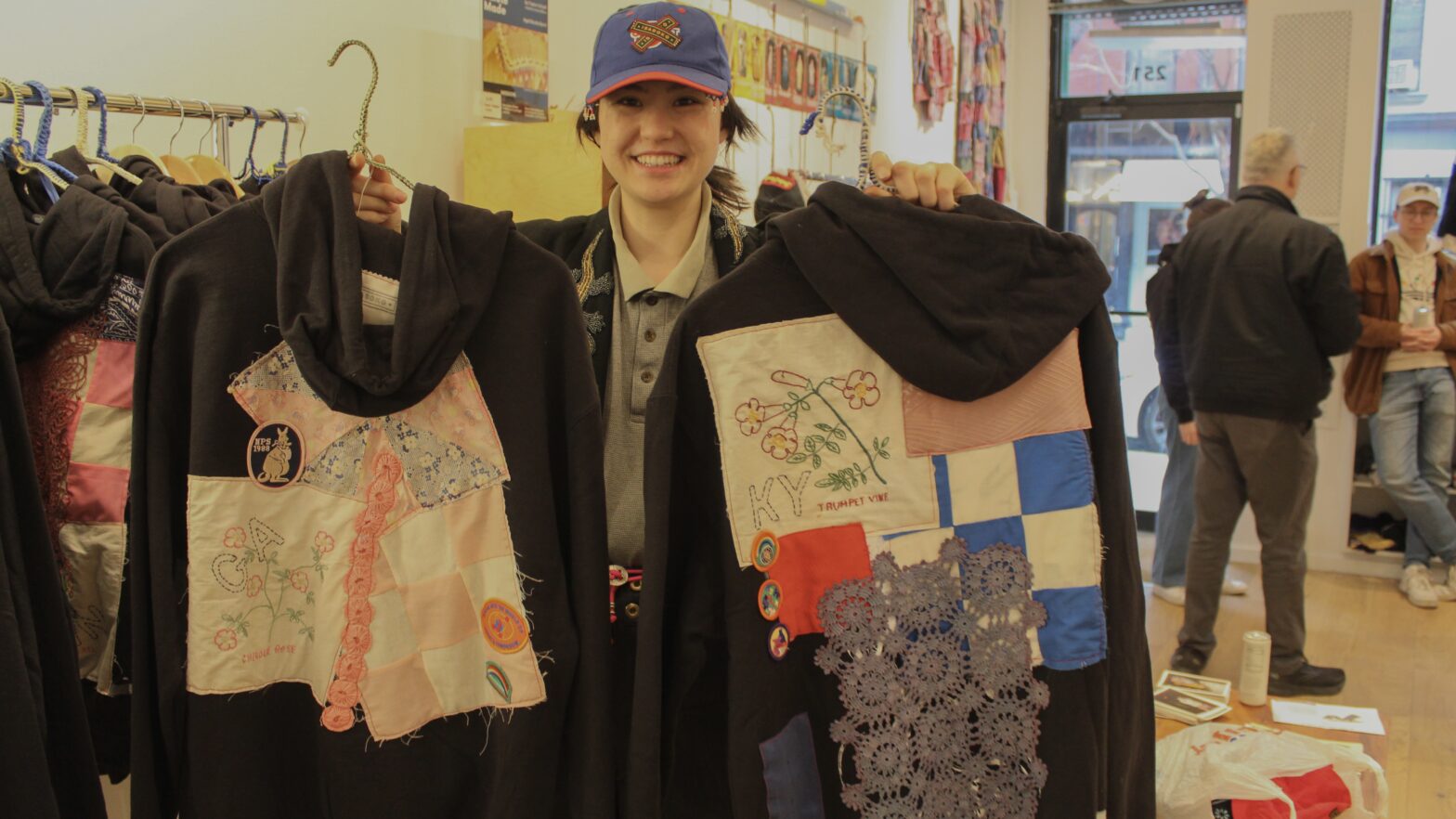On March 20, 2024, Parsons alum Isabella Li Kostrzewa brought the party to 251 Elizabeth St. From 6 p.m. to 8 p.m., customers filled the space, circling racks of coats, sweatshirts, and trousers—all from Isaboko, Kostrzewa’s rapidly growing clothing brand.
After winning The Pitch, an initiative created by pop-up agency Parasol Projects, 2023 Parsons graduate Kostrzewa was awarded four days (March 20-24) in the shop to showcase their work, with the designer hosting an open-invitation party on the 20th.
To the untrained eye, the shop’s Nolita location might not seem out of the ordinary. But New York residents know the truth: even a temporary spot on that coveted stretch of real estate is a big deal. Huge.
“It’s crazy, because people not from New York don’t really get the gravity of having a pop-up in Nolita,” they said. “But people from New York, when they see the location, are like, ‘wait, what?’”
One year out of Parsons, Kostrzewa has already amassed a large following. Their journey began on “Project Runway: Junior,” where they were a finalist on Season 2. Their accolades—to name a few—include the Council of Fashion Designers of America’s Re: Generation Innovation Award and an invitation to the Circular Design Summit at Aalto School of Design in Helsinki. They were also the youngest, and second American in 15 years, to become a finalist for the Redress Design Awards, the largest international sustainable fashion design competition.
At The New School, they were a Resident Assistant and studied under Colleen Macklin, Leila Kelleher, Madeline Schwartzman, Sariah Park, Thaddeus Taylor-O’Neil, and senior thesis professors Marie Geneviève Cyr and Sarah Thorn. These professors played an important role in their education and helped shape Isaboko into what it is today, Kostrzewa said.
With a budget of $8000 to invest in production, Kostrzewa was determined to make something special: a pop-up that would act as a jumping-off point for the rest of their brand.
“I’m going to go down to my last dollar, but I’m going to get this stuff ready and hopefully really set myself up to make a sustainable business going forward and use this pop-up as a platform to do that,” they said.
“I’m excited to be a little part of Izzy’s journey because Izzy’s the best person ever,” said Jonna Grigelevich, house graphic designer for Isaboko and Kostrzewa’s roommate. “They have such a genuine soul.”
Sustainability and gender-free design are pillars of Isaboko’s clothing production and brand message. At the pop-up, Kostrzewa sold a selection of upcycled hoodies made with leftover merchandise from a company that had planned to send the material to a landfill. Each was made to represent a different state, with Girl Scout patches and various state landmarks adorning the fabric.
Other products available included zero-waste jackets and pants, beaded hats made in collaboration with Paiute Made by Taylor Uchytil, and bolo ties made in collaboration with Eileen Pappas, a Parsons alum and former professor. Isaboko’s clothes are made to order, with production time taking about six weeks. In a culture of instant gratification, the brand sheds light on the environmental importance of slow fashion.
“I’m just simply not interested in using new material,” they said. “I’m not interested in making wasteful patterns, and I’m not interested in designing for women or designing for men. I’m trying to pioneer a system that could usher us into a radically sustainable future that other designers could follow.”
At the heart of Kostrzewa’s design is a movement called “Solarpunk,” which appeared on hats sold in the pop-up shop, as well as a print on the wall entitled “15 ideas for a Solarpunk future.”
Solarpunk, they explained, is a literary and artistic movement grounded in hope for a sustainable future. It centers diverse voices and utilizes eco-friendly systems to create a better world. These ideals fuel Isaboko—a brand geared towards “radically optimistic Earth freaks,” as seen on their Instagram.
“Solarpunk is like radical optimism for the future of humanity,” they said. “And it’s also showing us that humans can and are actively trying to make the world a better place.”
Solarpunk ideas are also seen in the construction of Isaboko’s clothes.
“All of my pants have six inches of adjustability, so they could be worn as your body fluctuates throughout the seasons,” said Kostrzewa, “Which to me is a very Solarpunk idea about—okay, we can have clothes for longer, and also, we don’t need to try to force our bodies into clothes.”
Kostrzewa refuses to resign themselves to climate pessimism. They don’t see the depletion of Earth’s resources as inevitable, but rather something the fashion industry can actively combat through sustainable practices. This optimism is a key trademark of the brand, and likely, a significant reason for its success. Kostrzewa isn’t just making clothes, they’re questioning the ideals the industry was built on.







